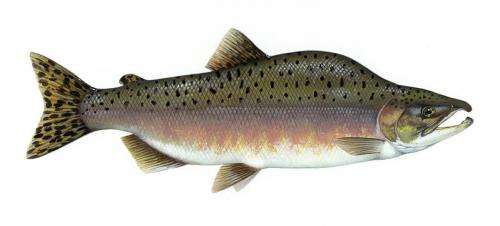May 25, 2016 report
Study exposes possible reason for 'drop out' fish in aquaculture salmon farms

(Phys.org)—A team of researchers from Norway, Denmark and the Netherlands has found evidence that might explain "drop out" fish in salmon and other fish farms. In their paper published in the journal Royal Society Open Science, the team describes their studies of salmon brain chemistry of specimens taken from fish farms and what their findings might mean for improving fishery results.
As the world continues to yearn for ever more sources of food, some entities had taken to fish farming as a way to provide sustainable seafood yields. But, as the business matures, most have noted losses that occur in the form of "drop out" fish—individual fish which do not grow as large as others, become morose, cease moving around and eventually die or get tossed into the trash pile. To date, because the science of fish farming is still somewhat new, little is known about such "drop out" fish, or if something can be done to prevent them from occurring, thereby reducing losses.
To learn more, the researches obtained many samples of such fish, along with healthy fish taken from the same fish farm sites in Norway, and did some digging. Suspecting, based on their "sad" behavior, that the fish were possibly experiencing a form of fish depression, the team took measurements of cortisol production and elevated brain serotonergic activation, both of which are common in humans that experience chronic depression or in other animals that have been exposed to long periods of stress. They report that they found both present in the "drop out" salmon, suggesting that they became listless due to overexposure of stimuli and other stress factors, which led to them becoming seriously depressed—so depressed that they became incapable of responding to new sources of stress.
The researchers suggest that the "drop out" fish came to their condition due to stresses they encountered that were not in their natural environment (overcrowding, aggressiveness from other fish, handling by humans, vaccinations, etc.) Stresses that all of the fish in the fish farm were forced to endure—it was only those that were not able to cope with the highly stressful environment that were overwhelmed and succumbed to depressive-like symptoms. The team further suggests that losses due to "drop out" fish could be reduced by reducing or eliminating the stress inducers that exist as a normal part of aquaculture processes.
More information: Marco A. Vindas et al. Brain serotonergic activation in growth-stunted farmed salmon: adaption versus pathology, Royal Society Open Science (2016). DOI: 10.1098/rsos.160030
Abstract
Signalling systems activated under stress are highly conserved, suggesting adaptive effects of their function. Pathologies arising from continued activation of such systems may represent a mismatch between evolutionary programming and current environments. Here, we use Atlantic salmon (Salmo salar) in aquaculture as a model to explore this stance of evolutionary-based medicine, for which empirical evidence has been lacking. Growth-stunted (GS) farmed fish were characterized by elevated brain serotonergic activation, increased cortisol production and behavioural inhibition. We make the novel observation that the serotonergic system in GS fish is unresponsive to additional stressors, yet a cortisol response is maintained. The inability of the serotonergic system to respond to additional stress, while a cortisol response is present, probably leads to both imbalance in energy metabolism and attenuated neural plasticity. Hence, we propose that serotonin-mediated behavioural inhibition may have evolved in vertebrates to minimize stress exposure in vulnerable individuals.
Journal information: Royal Society Open Science
© 2016 Phys.org





















